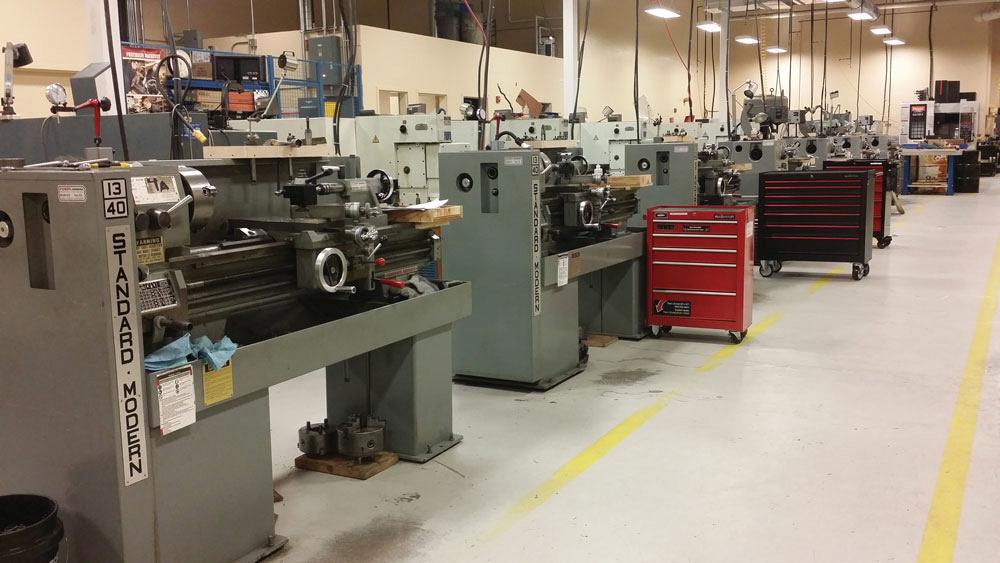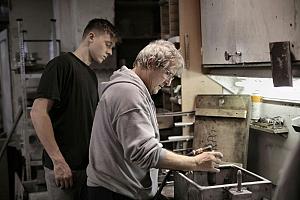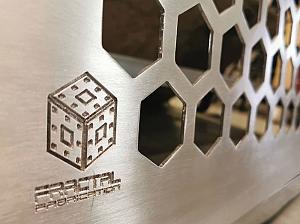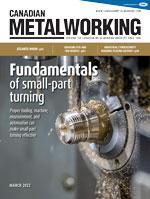Associate Editor
- FMA
- The Fabricator
- FABTECH
- Canadian Metalworking
Atlantic Boom: Part I
Atlantic harmonization and COVID-19 have forced colleges to rethink skilled trades training
- By Lindsay Luminoso
- April 4, 2022
- Article
- Management

About five years ago, the Atlantic provinces decided to work together to develop curriculum and exams that made more sense for the regional skills. kzenon/Stock/Getty Images Plus
Until recently the apprenticeship programs across the country have not undergone any significant upgrades to the model they have followed for decades. For the most part, there has been some evolution in content as technology has changed and advanced, but not necessarily in structure.
For the last decade, the Atlantic provinces were all working with their own chosen set of curriculum guidelines and exams. For example, Prince Edward Island (PEI) had a longstanding agreement with Alberta to use its content, curriculum, and exams.
“Because we are such a small jurisdiction, we really had no choice but to reach out to larger provinces that had the capability and resources to develop and maintain skilled trades training curriculum,” said Grant Sweet, director of apprenticeship and trades, PEI Department of Economic Growth, Tourism, and Culture. “This worked for a while, but we did notice that the content and processes were very specific to industry in Western Canada, particularly oil and gas, and certainly didn’t have the applicability in Atlantic Canada. This made it challenging for PEI apprentices to obtain the necessary experience to be successful in their Red Seal program.”
Atlantic Harmonization
About five years ago, the Atlantic provinces decided to work together to develop curriculum and exams that made more sense for the regional skills. Industry in the area had been advocating for an update for years, and today all of the metal trades training curriculum is standardized across PEI, Nova Scotia, New Brunswick, and Newfoundland and Labrador.
“This movement towards harmonization allowed for important discussions to take place with all stakeholders,” said Sweet. “Even before COVID hit, we were already looking at ways to develop online content and find new delivery models that made sense for industry. These conversations were particularly active with our welding and machinist trades.”
The aerospace sector in PEI has always supported the training programs but recently had struggled with laying off workers to send them for training, so it asked the province to come up with an alternative delivery model. One company committed to releasing its workers every Friday to attend the practical training at Holland College; the apprentice committed to working a couple hours in the evening and weekend to make up the time; and the college committed to lengthening the program over 20 weeks to ensure students were properly prepared.
Sweet noted that one challenge with this shift was that funding and support come from the federal government and were tied to the EI system, and because there were no layoffs, the funding was no longer applicable. The province was able to find internal funding to support the training programs.
The next evolution from that alternative delivery is an elongated block release program, in partnership with federal government. This pilot program is a three-year blended learning program, wrapping up in March 2022.
“We had early success and decided to develop online curriculum in partnership with Holland College. We got pilot funding from Employment and Social Development Canada (ESDC) to do a three-year trial,” said Sweet. “It's dramatically changed the way that companies are participating in the program. I don’t think we'll ever go back because industry probably won’t let us return to traditional block release. This has taken the best of all options and found a solution to a particular challenge.”
And while this pilot has been successful, there were several hurdles at the beginning. Technology, specifically rural broadband issues, needed to be sorted out. But this new program includes a delivery model that speaks to what industry was asking for and made it more accessible for students.

Holland College’s Ken Muirhead believes that when things get back to normal, there will be serious pent-up demand for skilled tradespeople. He also thinks that turnover and retirements will drive up demand for new talent. Holland College
“The challenge with such a small province is that many of our students have to go off-island for training, especially in the low-use trades like machinists,” said Sweet. “We tend to specialize in the high-use ones in the province like carpentry and welding. The next phase is to partner with the Atlantic provinces to develop an online, remote delivery system that would look similar to a centre of excellence -- where maybe Nova Scotia is the training hub for oil burner technician and PEI is the training hub for sheet metal -- and collaborate to make skilled trades training more effective. I also see industries taking on new technology and employing non-traditional jobs and skills for that sector. For example, I think we are seeing more industry companies outside of traditional sectors hiring machinists where even five years ago that would not have been the case.”
Holland College
COVID-19 certainly caused significant upheaval, particularly in industries directly hit by restrictions. PEI’s aerospace sector is struggling to find its footing and at the moment is not making any long-term plans related to hiring or expansion.
“I'm always on the lookout for employment prospects for my students,” said Ken Muirhead, learning manager - precision machinist, Holland College, Summerside Waterfront Campus. “I really can't predict it right now, but my gut feeling is that when things get back to normal, there will be serious pent-up demand. I also think there is a lot of turnover happening and going to happen in the near future. People are retiring, and there are a couple of employers recruiting workers, but it’s not a huge number. We are experiencing a double whammy right now; we are at the tail-end of the aerospace supply chain that was hit by COVID, and our farm equipment manufacturers, which is a significant industry, are dealing with a shutdown of potato exports.”
Holland College offers a one-year pre-employment machinist program that students can take before moving to an apprenticeship program. Students have the opportunity to write the level 1 apprenticeship exam at the end of the school year, but they must work 800 additional hours (beyond the 1000 hour credit from Apprenticeship PEI for successfully completing the Holland College Precision Machinist program and passing the level 1 apprenticeship exam) in industry to complete their first-year apprenticeship.
“The core of the trade hasn't changed in 40 or 50 years as far as shop practices go,” said Muirhead. “However, CNC is a big factor now, and the two-year programs focus heavily on this area. So, my students can go on and take the second year at New Brunswick Community College in Moncton and really focus 100 per cent on CNC. While our curriculum related to CNC hasn’t changed much in the last decade, we have introduced 3D printing and always run the latest software. We even have a couple of shops in PEI that have metal printers.”
One of the challenges right now is that no program has a significant 3D printing component, so industry is forced to look at other trades like welding or machinist programs to recruit from. Muirhead believes that 3D printing should be incorporated into two-year programs, especially in the second year when there is an emphasis on programming and modelling, which will help fill market gaps.
For the most part, CNCs slowly have been making their way into small shops throughout the province but not at the same rate as in other areas of the country. Muirhead estimates that only about 25 per cent of shops are working with CNCs. He attributes this to the fact that PEI is heavily skewed towards metal fabrication, where a machine shop is needed to support fabricating activities.
In the meantime, Holland College is working to adapt its program to fit the needs of students and industry. COVID forced Muirhead to develop online static content, where students can learn asynchronously on the theory portion of the program.
“This year's group hasn’t quite engaged with that material as last year's class did,” said Muirhead. “So now I'm doing the class live, so it’s synchronous. This group just seems to work better that way, but it depends on the class. And while I've never been able to deliver any shop [classes] online, I'm going to try to do some machining demos and live instruction to allow students to ask questions.”
The college is able to promote distance learning and attract students who may not be able to access traditional learning models. The blended machinist apprenticeship model allows for students to come in one day a week in the afternoon and evening to ensure that there is no conflict with employers and no layoffs.
“We are on our second intake, and the first was a bit challenging,” said Muirhead. “We have a new instructor this year that is comfortable and even enthusiastic about it and the technology, so it’s going well. I’m very hopeful about the next few years. I recently had an interesting conversation with Pratt & Whitney in Halifax. A recruiter called me to discuss hiring prospects. The company has just realized that its employees are going to age out in the next few years and he was doing a survey of every community college in Atlantic Canada to learn about the machining and related programs. They'll need highly skilled workers, especially because of the advanced automation, and they want to make sure that the talent pool and skill level will be available. I believe it is.”
Don't miss Part II of this article that looks at how New Brunswick Community College and Nova Scotia Community College have approached skilled trades training.
Associate Editor Lindsay Luminoso can be reached at lluminoso@canadianmetalworking.com.
Government of PEI, www.princeedwardisland.ca
Holland College, www.hollandcollege.com
About the Author

Lindsay Luminoso
1154 Warden Avenue
Toronto, M1R 0A1 Canada
Lindsay Luminoso, associate editor, contributes to both Canadian Metalworking and Canadian Fabricating & Welding. She worked as an associate editor/web editor, at Canadian Metalworking from 2014-2016 and was most recently an associate editor at Design Engineering.
Luminoso has a bachelor of arts from Carleton University, a bachelor of education from Ottawa University, and a graduate certificate in book, magazine, and digital publishing from Centennial College.
subscribe now


Keep up to date with the latest news, events, and technology for all things metal from our pair of monthly magazines written specifically for Canadian manufacturers!
Start Your Free Subscription- Industry Events
MME Winnipeg
- April 30, 2024
- Winnipeg, ON Canada
CTMA Economic Uncertainty: Helping You Navigate Windsor Seminar
- April 30, 2024
- Windsor, ON Canada
CTMA Economic Uncertainty: Helping You Navigate Kitchener Seminar
- May 2, 2024
- Kitchener, ON Canada
Automate 2024
- May 6 - 9, 2024
- Chicago, IL
ANCA Open House
- May 7 - 8, 2024
- Wixom, MI




















